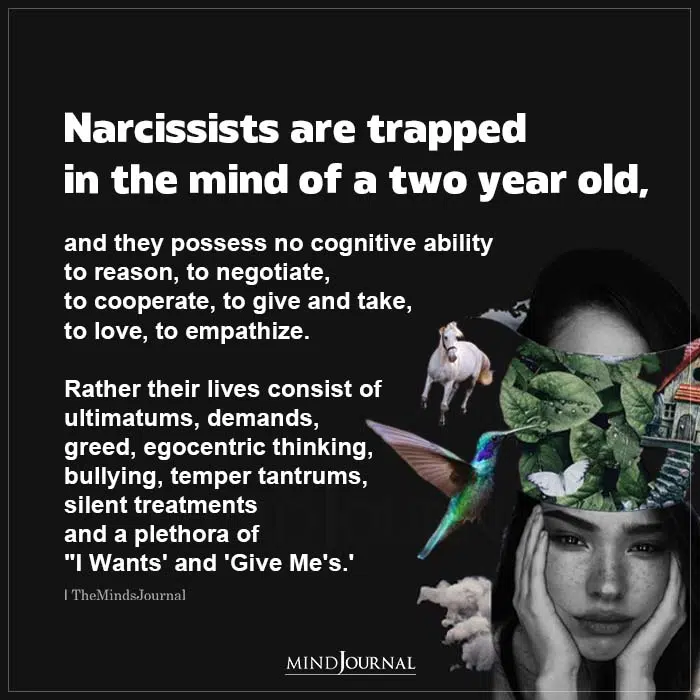Can narcissists feel empathy? Are there any narcissists with empathy? Does an empathic narcissist exist? Yes, some narcissists can have empathy as narcissism is more complicated than just mere black and white.
Can narcissists be empathic?
While most of us tend to believe that narcissists lack empathy, and rightly so, many narcissists can be empathetic and sense the thoughts and feelings of others. But aren’t narcissists supposed to be bad people? Well, that depends on how we define a “narcissist”.
In this era, narcissists have been given a bad reputation and seen as the villain of the story, but we need to realize that narcissism lies on a spectrum and most of us have some narcissistic traits in varying degrees.
A “real” narcissist is someone suffering from Narcissistic Personality Disorder (NPD), a mental health condition. They are unable to control or change their thoughts, emotions and behaviors without help and support from loved ones and professionals.
So it’s not really the best thing to do to call someone “evil” when they are suffering from a personality disorder they can’t do anything about.
However, most of the time people with narcissistic traits are just mean, selfish and uncaring which makes them toxic as people who actually have NPD are rare.
While people who have narcissistic traits and not necessarily NPD can be really toxic and abusive and wreak havoc in your life, we need to look beyond these popular “good-and-evil” labels to truly understand what empathic narcissists are.
This means that while some narcissists can possess empathic abilities, some empaths can also possess narcissistic traits. Reality exists in the gray area between our black-and-white way of seeing the world.
Related: 7 Common Myths About Narcissistic Personality Disorder
What is an empathic narcissist?
Empathic narcissist definition: It refers to someone who displays both narcissistic and empathic traits. They can be charming and skilled at reading people’s emotions, but they may also use these abilities to manipulate and control others for their own benefit.

Yes, the term “empathic narcissist” is an oxymoron, as narcissists are renowned for their lack of empathy. But some narcissistic individuals are capable of showing some level of empathy towards others.
They can easily read other’s emotions and use that knowledge to gain control over others for their personal gains. They may seem caring and compassionate, but their motivations may be driven by self-interest.
While they may understand and “empathize” with your emotions, they view their ability to be empathetic as weakness. They believe that they are victims and being able to feel others’ emotions is a negative experience.
This is why they refrain from being caring, compassionate and sympathetic towards others as it will not lead to any personal benefits.
People who are genuinely empathic are compassionate towards others and try to help them. However, a narcissistic person with empathic abilities is unappreciative of their emotional capabilities and tries to avoid being open to the emotions of others.
They do not prefer to be emotionally vulnerable and create strong boundaries around them, which prevents them from being caring and sensitive towards others.
Related: The Dirty Empath With The Narcissistic Streak Of Infidelity
Traits of an empathic narcissist
Empathy and narcissism are generally considered to be opposing traits and it is rare for a person to exhibit both in equal measure. However, some individuals with narcissistic traits may exhibit behaviors that involve both traits to some extent.
Here are some common traits that may be seen in individuals with NPD who display empathic behavior:
- Able to relate to others’ emotions, but only on a surface level
- Highly attuned to others’ needs and desires, but only to the extent that it benefits them
- May have a strong sense of entitlement and believe they deserve special treatment or attention
- High levels of empathy for certain people who they see as important or beneficial, but not for others
- Desire for gaining attention, validation and admiration from others using their empathetic abilities
- Need to be seen as a good person or a moral authority
- Tendency to manipulate others to achieve their goals, get what they want and maintain a positive self-image
- Lack of empathy for those they see as inferior or unworthy of their attention
- May lack genuine remorse or empathy for their own harmful behavior towards others
- Tendency to exploit others for personal gain
- Tendency to use charm and charisma to win people over
- Belief in their own superiority or uniqueness with a tendency to feel entitled to special treatment or privileges
- May engage in acts of kindness or generosity, but only to receive praise or admiration
- Lack of concern for the feelings or needs of others when it conflicts with their own goals or desires
- May become defensive or angry when their empathic behavior is not recognized or appreciated
- May exhibit a pattern of unstable or tumultuous relationships due to their inability to form deep, meaningful connections with others
It’s important to note that empathic narcissism is not an official diagnosis, and not all mental health professionals agree that it is a valid concept.
Hence, it should not be used to label or diagnose anyone. Moreover, a person with narcissistic personality may exhibit a range of behaviors and traits, and not all individuals with NPD display empathic behavior.

Empathic narcissists are still narcissists
It’s important to note that having some narcissistic traits does not necessarily mean someone is a narcissist. Narcissism exists on a spectrum and many people exhibit some signs of narcissism without meeting the criteria for Narcissistic Personality Disorder (NPD).
Hence, individuals who display some narcissistic traits may also have moments of empathy towards others.
For example, they may feel sorry for someone who is going through a difficult time or offer help to someone in need. However, these instances of empathy are typically self-serving and may be used to manipulate or control others.
Related: Are Empaths Narcissists? 11 Signs Of A Narcissistic Empath
Empathic narcissists have an inflated sense of self-importance and a desire for admiration and attention, but they also have an ability to feel others’ emotions.
They may use their empathic abilities to play mind games with others and gain their admiration, but they may also genuinely care about the well-being of those around them.
This combination of traits can make it difficult to recognize an empathic narcissist, as they may seem caring and compassionate on the surface, but may be motivated by self-interest underneath.
Do they actually care like empaths?
Empathic narcissists often use their ability to read people’s emotions to their advantage, gaining trust from others. They may use people’s vulnerabilities to exploit them for their own benefit, often in subtle ways. Their empathy also allows them to use flattery or emotional blackmail to get what they want.
However, empathic narcissists may also feel genuine empathy and care for others, which can be confusing for people who interact with them regularly. They may actually want to help others and may be skilled at providing emotional support.
An empathic narcissist can be challenging to deal with, as they can be both charming and manipulative. It is important to set boundaries with them and be aware of their tendency to use their empathic abilities to their advantage.
It is also essential to recognize that while they may be empathic, they may still struggle with self-centeredness and a lack of empathy in some situations.

What is a relationship with an empathic narcissist like?
A relationship with empathic narcissists can be complex and challenging. While they may exhibit some degree of empathy, their narcissistic tendencies can make it difficult for them to truly connect with others on a deep emotional level.
On the surface, these narcissists may appear to be caring and empathetic towards their partner, but this behavior is often driven by a desire for validation rather than genuine concern for their partner’s well-being.
In the beginning stages of the relationship, the narcissist may be charming, charismatic, and attentive, showering their partner with compliments and gifts.
However, as the relationship progresses, the narcissist with empathy may become increasingly controlling and manipulative, using their partner’s emotions as a tool to control them.
Related: What Is Healthy Narcissism? How Does it Differ from Self Love?
While empathic narcissists may empathize with their partner’s emotions, they may become defensive or dismissive when their partner expresses their negative emotions. This can lead to a lack of emotional intimacy and depth in the relationship.
The narcissist with empathic abilities may also struggle with boundaries, and may become overly involved in their partner’s life or try to control their partner’s actions and decisions. This can lead to feelings of suffocation and a loss of independence for the partner.
A relationship with empathic narcissists is often dominated by –
- Intense charm and charisma which they use to win people over and hide their negative traits.
- A sense of superiority, which can lead to feelings of entitlement and a lack of consideration for their partner’s needs and feelings.
- Emotional manipulation to make their partners do what they want or to maintain control in the relationship.
- Lack of empathy for their partner’s feelings and needs as they only exhibit empathy for certain people.
- Blame-shifting, playing victim and avoiding responsibility for their actions when things go wrong in the relationship.
- Inconsistency in their behavior and emotional responses, making it difficult for their partner to know what to expect from them.
- Idealizing their partners at the beginning of the relationship, only to later devalue them as the relationship progresses.
The truth is, a relationship with an empathic narcissist can be emotionally draining and volatile. It is important to prioritize self-care and seek support from a therapist or other mental health professional if you feel that you are in a relationship with such a narcissist.
Dealing with an empathic narcissist
Dealing with an empathic narcissist can be challenging, as their behavior can be unpredictable and emotionally exhausting. However, there are some strategies that may help you to cope with an empathic narcissist, such as –
1. Setting boundaries
Establish clear boundaries around what you are and are not willing to tolerate in the relationship, and communicate them clearly and assertively. This can help to prevent the narcissist with empathy from overstepping boundaries and taking advantage of others.
2. Practicing self-care
Take care of yourself and prioritize your own well-being. This may include getting enough sleep, eating well and engaging in activities that bring you joy and fulfillment.
Engaging in self-care activities such as exercise, meditation, and spending time with loved ones can also help to reduce stress and promote emotional well-being.
3. Being practical and realistic
Recognize that a narcissist with empathy may not be able to change their behavior or develop a true sense of empathy, and adjust your expectations accordingly.
Related: Do Narcissists Lack Empathy? Research Attempts To Find Out
4. Seeking support
Reach out to friends, family members, or a professional for support and guidance in managing the relationship.
It can be helpful to seek support from a therapist or counselor who can provide guidance and support as you navigate the challenges of dealing with an empathic narcissist.
5. Focusing on your own needs
It’s essential to prioritize your own emotional well-being and to focus on meeting your own needs. This can help to reduce feelings of codependency and enable you to make decisions that are in your best interest.
6. Avoiding falling victim to their manipulations
Refuse to be manipulated by a narcissist with empathy and avoid getting drawn into arguments or power struggles.
7. Holding them accountable
When a narcissist with empathy behaves inappropriately or crosses a boundary, hold them accountable for their actions and communicate the consequences clearly.
8. Walking away from the relationship
In extreme cases, ending the relationship may be the best course of action. If the narcissist is unwilling to change their behavior or seek professional help, it may be necessary to end the relationship to protect your own emotional well-being.
This is especially true if the relationship is causing significant harm to your mental health and well-being.
Remember, dealing with an empathic narcissist can be challenging, but it is possible to set boundaries and prioritize your own well-being while maintaining the relationship if you choose to do so.
It may be helpful to seek guidance from a therapist or other mental health professional to develop a plan for managing the relationship.

Narcissism or empathy?
The concept of “empathic narcissists” is somewhat controversial, as the two terms seem contradictory. Narcissism is typically associated with a lack of empathy, while empathy involves understanding and sharing the feelings of others.
However, some experts believe that it is possible for a person to possess both traits to some extent.
Empathic narcissists are individuals who exhibit traits that can be mistaken for genuine empathy, but are actually driven by a desire for admiration, validation, and control.
It is important to prioritize self-care and seek support from a therapist or other mental health professional if you are in a relationship with a narcissist with empathy.
It’s important to remember that individuals with narcissistic personality disorder may require professional help to address their behavior, and seeking the guidance of a mental health professional is essential for anyone dealing with the challenges of an empathic narcissist.
Related: The Dark Side Of Being An Empath
Frequently Asked Questions (FAQs):
Can you be an empathic narcissist?
Yes, an empathic narcissist is someone who exhibits both empathy and narcissism, using their empathy to manipulate and control others while maintaining a sense of superiority.
Can someone be both narcissistic and empathetic?
Yes, someone can exhibit both narcissistic and empathetic traits, though the extent to which they exhibit each trait can vary. This may result in complex and sometimes contradictory behavior in relationships.
What is an empath disorder?
There is no official diagnosis for an “empath disorder,” but some individuals identify as empaths and describe heightened sensitivity to the emotions of others.










Leave a Reply
You must be logged in to post a comment.